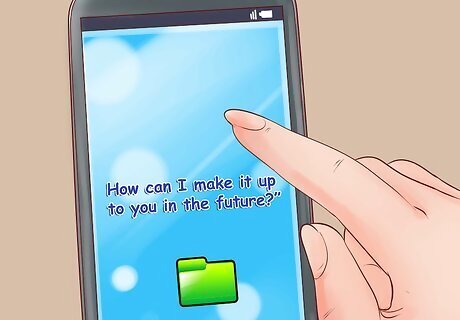
views
Figuring Out What Went Wrong

Think about what may have happened. He may not be talking to you or hanging out because he’s either angry about something you did or he’s made new friends and is busy with other things. If he’s changed how he acts around you because he’s no longer interested in being friends (or partners or whatever), there’s not much you can do to change that. In those situations, it has to do with him, not with you. If you think he may be angry, think about why. People get angry when they feel like you did something that had a negative impact on them. So the first step on the road to reconciliation is figuring out what you did to trigger him. Remember that sometimes what seem like minor actions or decisions to us can have big impacts on others, so think not only about what you’ve done recently but about which of your actions might have had negative effects on him. Once you have an idea of what you did that upset him, you can start working on de-escalating the situation. Talk to a therapist or counselor about the situation, as they’ll be able to guide you through the best decision.

Step into his perspective. Key to getting someone past their anger or upset is showing them you understand their perspective and recognize how what you did affected them. Put yourself in his position and imagine how whatever you suspect upset him must have made him feel. Empathize with those emotions and approach him with that empathy in mind. For example, to you, you were just late picking him up because traffic was crazy and you realized you forgot your phone halfway there. It wasn’t a big deal, it just happened that way. But to him, he had to stand out on the curb for 45 minutes when it was dark and cold, even though he told you what time to be there three times, and you promised you would be.

Empathize. Once you have a sense of what may have upset him, make a genuine effort to empathize with how he may be feeling. If you were late picking him up, in addition to thinking about how it might have appeared from his perspective, imagine what it may have felt like. For example, to him, it may feel like you didn’t make him a priority, you didn’t care about his discomfort or whether he had other things to do, and you broke a promise. Think about how you would feel about those things and empathize with him.
Apologizing

Apologize. Apologize early and often; admit that you were wrong (if you were) and take responsibility. Tell him that you were wrong and that you won’t do it (whatever it was) again. And then don’t do that thing again. Don’t use the sorry-not-really-sorry line of “I’m sorry you got so upset.” It shifts the responsibility onto him and makes it sound as if you’re not sorry for your actions, you just wish he wouldn’t get mad about it. If he responds with a--potentially justified—angry text, apologize again. Continue apologizing if he comes at you with more angry responses. Simply say something like, “I’m sorry--I was wrong.”

Show that you understand the impact your actions had on him. Just apologizing or trying to explain that your intentions were good won’t work. Saying you’re sorry isn’t enough—you need to show you recognize the negative consequences your actions had on him and that you sincerely regret it. If he feels like you genuinely understand why your actions made him mad, he’s more likely to feel validated and begin forgiving you. Even if you don’t necessarily think his feelings or reaction is justified, apologize anyway. If you want him to like you again, you want him to see you understand how he’s feeling.

Avoid escalating the situation. Even if you say you’re sorry, it won’t be enough to make him like you again if you then start saying things that will escalate the situation. Don’t, for example, say anything about thinking his reactions were irrational or unjustified. It will make him feel like you aren’t really sorry and don’t really understand the situation—and he’ll go back to being mad. Don’t bring up things he’s done to upset you in the past. Turning the conversation into a tit-for-tat about who did what to who isn’t going to diffuse the situation. It will only make it drag on longer and make him less likely to forgive you.

Ask what you can do to make it up to him. Asking for his input on what you can do shows that you’re listening to him and genuinely want to know what would make things better from his perspective. For example, you might say something like, “I know you had to wait 45 minutes for me and that it probably felt like I wasn’t making you a priority. How can I make it up to you in the future?”

Make him smile. Humor is disarming. If you can make him laugh, or even smile a bit, you can get your foot in the metaphorical door. Try being humorously self-deprecating. If humor is disarming, affable self-deprecation is doubly so. So try poking a little fun at yourself or acknowledging one of your endearing flaws. You might text him something purposefully ridiculous, like, “I’m really sorry I was late picking you up--we both know I’m a klutz, and I must have walked into at least five walls trying to get here.” Or you could text something more honest but still gently self-deprecating, like, “You know how I look at the time on the clock as a challenge instead of a warning? Well...the clock won.”

Let him know you’re thinking about him. Particularly if the guy’s mad because he feels like you ignored him or his needs in some way, remind him that you do think about him—often. For example, you might text him with an affectionate reference to something you saw that reminded you of him (bonus if it relates to a private joke between you), like, “I just saw a car with a Florida license plate and it reminded me of all the stories you tell about growing up there. It made me smile.”
Knowing When to Give Up or Back Off

Know when to back off. Don’t text him excessively. Apologize, and if he doesn’t immediately respond or forgive you, back off. If you keep texting him, you’re going to undo any potential good you’ve done by irritating him rather than charming him. If he needs time to get over it, give him that time. Let him come to you when he’s ready.

Don’t press him if he won’t tell you why he’s mad. If he won’t tell you what’s upsetting him, it’s either because he’s so mad he can’t talk about it or it’s a ploy for attention. In either case, you need to let the issue rest and let him come to you. If he seems truly angry but can’t or won’t tell you why, he probably needs time to process and let the worst of the anger pass. Even if you don’t know what you did and it’s driving you crazy not to know, let it be. Don’t insist that he tell you; let him take the time he needs. When he’s ready, he’ll come to you and you can work things out from there. If his anger doesn’t seem entirely genuine, he’s probably acting angry to get attention, and the more you ask what’s wrong and what happened, the more he’ll prolong the situation to get as much out of it as he can. Just tell him you don’t know what’s angering him and that you’re sorry if it’s something you’ve done. Then leave it at that and let him come to you when he’s done trying to manipulate your attention.

Know when to give up. If he’s so mad about something that none of your attempts to empathize or apologize are working, step out of the situation. There’s nothing else you can do or say at this point to make him like you again, so it’s best just to back off. After some time has passed, he may be feeling less upset and may come to you when he’s ready to talk. You can’t force him to talk to you before he’s ready, so your best option is to wait.

Know when it’s not worth it. If he’s constantly getting angry with you over things you either don’t understand or feel are unreasonable, consider whether the relationship is really worth it. If being around him causes you more grief than pleasure, maybe it’s time to just let the relationship go. If he verbally, emotionally, or physically abuses you when he’s mad, get out of the relationship immediately.

Get some satisfaction. If all else fails and the guy probably isn’t going to give in no matter what you do, you might as well have a little fun. “Makeup apps” allow you to choose the gender of the person you’re trying to make up with and which excuse you want to use to win them back. Obviously, if your sincere efforts were unsuccessful, an app probably isn’t going to do any better, but if you’ve got nothing left to lose, you might as well. Worst case scenario, you’ll be entertained by the messages the app sends on your behalf saying you were kidnapped by Russians. Try coming up with clever responses to his non-responses. If he won’t text you back and you know he’s probably never going to, you might as well go out on a high note. Be hyperbolic (“I spent so long waiting for you to text back that feral cats ate my face and hands and now I’m texting you with my toes and will soon be dead.”) or incorporate some spot-on memes or gifs into your final sign-off.

Move on. Don’t dwell on the situation or stay up nights thinking about what you should have said or what a jerk he is. Accept that he’s upset and that the relationship might have to end. Start to go on with your life.




















Comments
0 comment